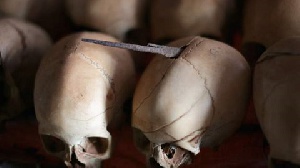 Rwandans have been reacting to the report of the involvement of France in the Genocide
Rwandans have been reacting to the report of the involvement of France in the Genocide
Rwandans visiting the Kigali Genocide Memorial react to the publication of a report Friday on France's role in their nation's 1994 genocidal atrocity against the Tutsi ethnic group.
The report -- based on research led by historian Vincent Duclert, concludes there had been a "failure" on the part of France under former leader Francois Mitterrand.
Our history out back bone, from our past we gain strength of rebuilding our new Rwanda. Genocide against Tutsi is our history that's why always we step back to remember our beloved who were silenced due to their ethnicity, and her we get strength to prevent whoever
— C. said (@chenrwanda) March 9, 2021
John Ruku-Rwabyoma, a member of parliament (MP) for the Rwandan Patriotic Front (RPF) believes that after all the time that has passed, this is finally a good move forward.
"It would have been even much better if France had come out openly and given the whole story as it was. Having said that, to see what came out today, as I said, it is a positive move in the right direction."
#Rwanda:Genocide is used to silence all those who oppose and criticize the @rpfinkotanyi this policy uses to violate human rights must stop@USAmbRwanda @UKinRwanda @ONU_fr @hrw @Europarl_EN @nytimes @_AfricanUnion @JoeBiden @Smith_JeffreyT @Elysee @EmmanuelMacron @JustinTrudeau pic.twitter.com/BIX1Zqfy6m
— Abdallah Nduhirabandi (@ANduhirabandi) February 23, 2021
Former Tutsi rebel and Rwandan President since the year 2000, Paul Kagame has maintained for decades the role of France in the genocide and only time will tell if relations between the two countries - following this report, will improve.
Macron, who ordered the creation of the commission in May 2019, welcomed the report as marking "considerable progress" in understanding France's role in Rwanda from 1990 to 1994.
The Elysee said it hoped the report would mark an "irreversible" reconciliation process between France and Rwanda, which Macron has said he wants to visit this year.
I’m looking forward to what the commission of enquiry has uncovered about the #Rwandagenocide
— Your Gentleman Friend (@Tau_Amour) March 26, 2021
- Uncomfortable Truths -
The genocide between April and July of 1994 began after Rwanda's Hutu president Juvenal Habyarimana, with whom Paris had cultivated close ties, was killed when his plane was shot down over Kigali on April 6.
"Is France an accomplice to the genocide of the Tutsi? If by this we mean a willingness to join a genocidal operation, nothing in the archives that were examined demonstrates this," the report's conclusions said.
"Nevertheless, for a long time, France was involved with a regime that encouraged racist massacres... It remained blind to the preparation of genocide by the most radical elements of this regime."
It criticised the French authorities under Mitterrand for adopting a "binary view" that set Habyarimana as a "Hutu ally" against an "enemy" of Tutsi forces backed by Uganda and then offering military intervention only "belatedly" when it was too late to halt the genocide.
For Rwanda, genocide denial is getting more intense due to the fact that foreign countries were highly involved in preparing and supporting the genocide. It is in foreign countries where we are seeing much publicity of genocide denial.
— Regis (@RurenziRegis) February 19, 2021
France notably led Operation Turquoise, a military-humanitarian intervention launched under a UN mandate in June 1994. Its critics believe that it was in reality aimed at supporting the genocidal Hutu government.
And there have also been repeated accusations that authorities in Paris helped suspects in the Rwanda genocide to escape while under French military protection.
The report concluded that in July 1994, "murderers but also the masterminds of the genocide" were in a safe zone established by French forces in the west of the country "who the French political authorities refused to arrest".
The report tells of French decision-makers trapped in "post-colonial" thinking who supported the "racist, corrupt and violent" regime of Habyarimana as he faced a Tutsi rebellion which many considered was directed from English-speaking Uganda.